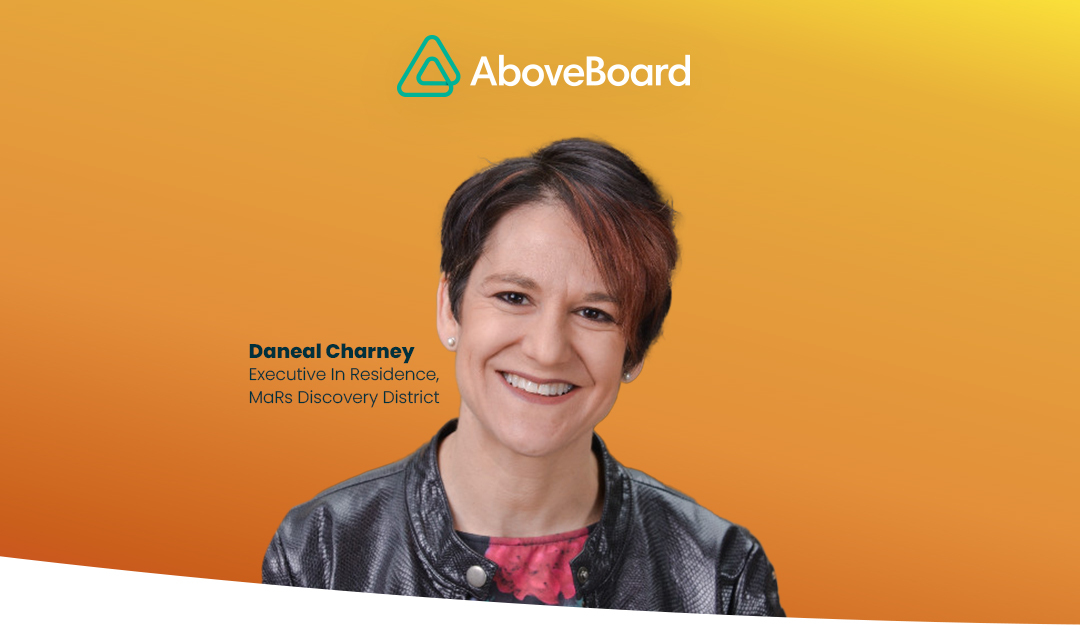With Faces of Leadership, we’re highlighting the unique perspectives of today’s top leaders and executives.
And today, we’re shining a spotlight on Daneal Charney, the Executive in Residence at MaRs Discovery District.
As the Fractional VP of People for some of the most promising North American growth-stage companies, Daneal was named in the Top 25 Human Resource Award Winner list and is the co-author of the 2021/22 People Benchmark Report for High Growth SaaS Companies.
Ahead is an edited portion of our interview with Daneal, where we chat all things leadership, diversity, equity, and inclusion, and advice for young professionals.
How would you describe your leadership style?
My leadership style is decisive, it’s a lateral thinker, non-linear, and it’s always evolving—always evolving myself, my team, and my client’s business.
How did you develop that style of leadership? Was there anything you learned from your first leadership experience?
What I learned from my first leadership role, where I was very much heads-down, hard-working, and really focused on excellence, is that it’s not about [dictating]. It’s about people wanting to work with you. It’s about people caring about you and that’s all about relationships.
“I look at my job role as a starting point, and I don’t let it limit me.”
So, what I learned from my first leadership role is to pay attention to relationships. Know what drives people, what people need. And try to make yourself memorable by doing something [that’s] out of your job description, out of the norm for someone, for their kids, whatever they care about.
What other strengths do you bring to your roles?
I’m often a change agent, someone who helps transform businesses. Whether that’s shifting a culture, building global teams, helping a company go public, or integrating a new team through an acquisition. Even in large companies I’ve worked for, I’ve been involved in transformation, and I really go outside of my role.
I look at my job role as a starting point, and I don’t let it limit me. When I worked for a large insurance company, for example, I noticed we really had a problem with effective meetings. So I created a framework [for] meetings that were more effective, more goal-oriented, more client-oriented. We put it in place and it saved our company millions of dollars.
More recently, I developed a branding campaign called Life is Short, Join a Startup. It was a branding campaign that helped hundreds of Canadian companies and helped them attract the best talent and attract that passive talent to their company.
Speaking of attracting the best talent, how do you prioritize diversity, equity, and inclusion in your work?
As an executive, I feel that it’s my job, and the job of other executives to always be going out of our comfort zone and be building networks outside of our [typical]networks so that we can truly bring in the best talent.
“I need to work for an organization that isn’t perfect, but is aware of structural biases and always fixing them.”
If I look back at every job I’ve left, it was because there wasn’t a sense of belonging anymore. Working in a neurodiverse team is important for me. It means I can fully participate in and bring my best self, and not having that is a dealbreaker for me. If I feel that my voice isn’t being heard, or other people’s voices aren’t being heard, it makes it very hard for me to stay in an organization long term. I need to work for an organization that isn’t perfect, but is aware of structural biases and always fixing them.
What advice do you have for younger or up and coming professionals?
I have five pieces of advice that I give to young professionals.
First: Always know what your ask is. Be very clear about what you’re asking so people can help you and can refer you. “I’m looking for a, b, and c.”
The second one is to spend time making your first impression. If you’re writing an email for example, be detailed and get it edited. A great structure for an email is: what’s my purpose, what’s the payoff for you, and what’s the process of how we’re going to engage.
The third one, I’d say, skip the corporate world—a little controversial—and join a startup. What you’re going to learn in one year is what you’d learn in three years in the corporate world, so it is the safest route.
The fourth piece of advice is that there’s never been a better time to create your own opportunity. If there isn’t one for you, try a new idea, build a new business, join an accelerator, volunteer, be a freelancer and use the skills you have.
And the last one is this: Looking for a new role is similar to market research. You have to know who your target is, so keep a list of target companies and target people. The great thing about that is when you’re talking to people, you can give them those names and then help them help you.









